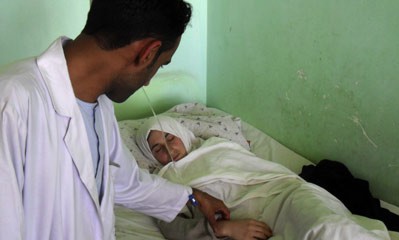Adnan R. Khan
For girls in Afghanistan, getting an education has always been difficult, if not impossible. But their struggle appears worse than ever recently as a series of poison gas attacks on girls' schools has sent at least 88 girls, some as young as 7, to the hospital.

A medic checks a schoolgirl in a hospital in Kunduz, Afghanistan. Dozens of Afghan girls have been hospitalized after poison gas attacks on their schools. (Photo: Fulad Hamdard, AP)
The attacks in Kunduz province, in the north of the country, come amid heightened Taliban influence in the region, raising fears that ultra-conservative elements in society are becoming bolder in their efforts to exert influence over social behavior. But no military defeat of the Taliban is likely to banish even violent opposition to female education, which has deep cultural roots in a large part of the country.
"Attacks like these spike in unison with the strength of insurgents," says Jennifer Rowell, head of advocacy for CARE International in Kabul. "But we have to remember: not all insurgents are Taliban, and not all attackers are insurgents. It's likely that the attackers, whoever they were, had a problem with the idea of girls' education."
It's still unclear whether the attacks were intended to kill or only terrorize female students into staying home. Girls at the schools reported seeing fellow classmates fall unconscious after smelling a strange gas in the air and then succumbing themselves.
Similar attacks a year ago also hospitalized dozens of female students, but all recovered. A police officer in Kunduz, requesting anonymity because he is not authorized to talk to the media, says the investigation is focusing on criminal elements rather than the Taliban, who in a statement to the media condemned the attacks. "This is the act of miscreants who just don't like the idea of girls being educated," the police officer says.
The broader implications of these sorts of attacks underscore the challenges Afghanistan's girls face even if the Taliban are defeated.
The root of the problem lies not in any one militant group, but in a broader and persistent aversion to girls' education among some segments of Afghanistan's ethnic Pashtuns, the same ethnic group as the vast majority of the Taliban. Culturally, the Taliban's rigid interpretation of Islam, including the banning of education for girls, is part and parcel of Pashtun society.
"There is no way around it," says Bashir Khan, a businessman in Kabul who counts himself among the staunchly anti-Taliban Pashtuns. "In Pashtun culture, a woman's place is in the home. Even some of the most educated Pashtuns believe this. I'm willing to let my daughters go to school but only to a point, maybe until they are 11 or 12 years old. After that, why do they need an education? Their life will be in the home."
Pashtun men like Khan resent the emphasis Western nations have placed on girls' education, arguing that they are trying to destroy Pashtun culture. "It's an insult to our way of life," he says. "We will not allow it. We see what happens to women in the West; we see it on television, in their music videos and movies. We will never let our women become so corrupted."
And the problem is not about to go away anytime soon. The U.S. and its NATO allies continue to make girls' education a pillar of their vision for a future Afghanistan, yet even by the most optimistic estimates only about 30 percent of school-age girls are enrolled in schools. And Washington now admits that the Taliban have a legitimate role to play in Afghan politics and society, since they represent the Pashtuns, Afghanistan's largest ethnic group by far, comprising 42 percent of the country's population.
But even a pacified Taliban will still bear the earmarks of Pashtun culture. Some Afghans, and a growing cadre of Western NGO workers, are gradually coming to accept the reality that improving women's rights will take generations in a country like Afghanistan. And that forcing Pashtun culture to change too quickly could be disastrous.
"Yes, there is some pushback," Rowell says. "There are still some pockets of cultural resistance to girls' education. And we are seeing a rising trend in the number of attacks on the education system in general over the last few years."
But she hastens to point out that Afghans in general are open to educating girls, if sensitivity to the culture is maintained. There are some members of the society, however, who will never accept change. And the grim reality is that more innocent girls will have to suffer before these elements disappear altogether.



